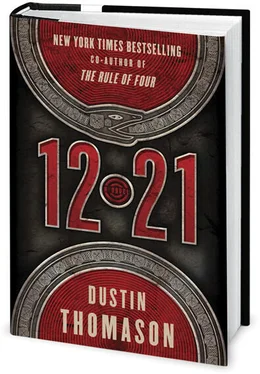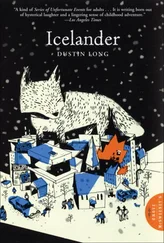“How can you be so calm?” Stanton asked Cavanagh.
“Because I have you to not be,” she said. “Now tell me something. How much sleep have you gotten? I’ll be on the ground in six hours, and I’m going to need you sharp and rested. If you haven’t slept, do it now.”
“Emily, I don’t—”
“I wasn’t making a suggestion, Gabe. That was an order.”
* * *
BACK IN VENICE, Stanton was surprised to see that nothing had changed. The evening crowds were in the beer gardens. Homeless drifters sat beneath the retail-shop awnings. Out on the boardwalk, men were still hawking charms to ward off the Maya apocalypse. For a moment, all this life made Stanton feel a bit better.
Just after eleven p.m., he stood in his kitchen, on the phone with the chief medical officer for the Guatemalan Health Service, Dr. Fernando Sandoval.
“Mr. Volcy told us that he came across the border after he was already sick,” Stanton said. “He was clear about that. You need to search clinics, facilities on the Pan-American Highway, and every local doctor’s office that serves indigenous people.”
“We have teams searching the area where he says he got sick,” Sandoval told him. “Despite the fact that it will cost us millions of dollars we don’t have, we’ve got people visiting every farm in the entire Petén and sampling cattle. So far they’ve come up with nothing, of course. Not a single trace of prion of any kind.”
“Not yet. But you understand how urgent this is, don’t you? From what we’re seeing here, you could have an epidemic soon.”
“There’s zero evidence that your second patient was ever here, Dr. Stanton.”
They’d broadcast the second victim’s photograph everywhere on the evening news, but no family or friends of the driver had come forward. “We haven’t ID’d him yet, but—”
“We have no other cases, and it is irresponsible of you to suggest anything of the kind. Neither of your patients got sick here. Though of course we will do everything we can to aid you in your investigation.”
The call ended abruptly, leaving Stanton frustrated. With no reported cases, the Guatemalans weren’t scared enough yet to take real action. Until they had a confirmed case of their own, Stanton knew it would be hard to get much at all from them, and, even then, their public-health capabilities were poor.
Stanton heard a key going into the lock and animal feet scurrying across the floor. He hurried to the living room, where he found Nina in worn jeans, a windbreaker, and still-glistening galoshes. Dogma ran toward him, and Nina followed, looping her arms around Stanton’s neck.
“Guess you found a place to dock, Captain,” he said, kissing her on the cheek.
“Should be fine until sunrise. You look like shit.”
“So everyone keeps telling me.”
Dogma started to whine, and Stanton rubbed the dog’s ears in circles.
Nina peeled off her coat. “When was the last time you ate something?”
“No idea.”
Nina beckoned him into the kitchen. “Don’t make me use force.”
There was a half-eaten container of Chinese delivery in the fridge, and she made Stanton eat it but let him listen to NPR updates while he did. The news program’s host was interviewing a CDC communications specialist Stanton had never heard of. They were talking about VFI in a way that made it obvious neither one of them had any real knowledge of prion science. A tightness grew in Stanton’s chest.
“What’s wrong?” Nina asked.
He fiddled with his fork, pressing liquid from the microwaved cubes of tofu. “This is going to get worse.”
“Good thing they’ve got you, then.”
“Soon people’ll realize we don’t know how to control a disease like this.”
“You’ve been warning them about this day forever.”
“I don’t mean CDC. I mean everyone else who’ll ask why we have no vaccine. Congress will go crazy. They’ll want to know what we’ve been doing since mad cow.”
“You did everything you could. Always have.”
Her voice was comforting. He reached out and took her hand. There was so much he wanted to say.
Nina kissed the back of his hand, led him into the living room, and turned on the TV. She leaned her head on his shoulder. Wolf Blitzer reported from the Situation Room, explaining that the identity of the second patient was still unknown.
“Do you have enough supplies on the boat?” Stanton asked her.
“For what?” she said. “Don’t get glass-half-empty on me. It depresses the dog.”
Looking at her, Stanton felt something he’d never expected before tonight. After a decade in the lab, a decade of fighting for funding to improve prion-disease readiness, a decade of warning that an outbreak was always just one accident away, now the unavoidable had come, and all Stanton wanted was to follow Nina back to the dock, get on Plan A with her and Dogma, and forget prion disease forever.
“What if we left?” Stanton asked.
Nina lifted her head. “And went where?”
“Who knows? Hawaii?”
“Don’t do this, Gabe.”
“I’m serious,” he said, staring into her eyes. “All I want is to be with you right now. I don’t care about anything else. I love you.”
She smiled, but there was something sad in it. “I love you too.”
Stanton leaned forward to kiss her, but before he could plant his lips on hers, Nina turned away.
“What?” he asked, pulling back.
“You’re under a lot of pressure, Gabe. You’ll get through this.”
“I want to get through it with you. Tell me what you want.”
“Please, Gabe.”
“Tell me.”
She didn’t look away as she spoke. “I want someone who doesn’t care if he shows up late to work because we spent too long in bed. Someone who’d actually get on that boat and leave all this behind. You’re the most driven man I’ve ever known, and I love that about you. But even if you came with me, in two days you’d be swimming back to the lab. You wouldn’t really walk away. Especially now.”
Stanton wanted to prove to her that the man she was describing didn’t exist, that it was a made-up version of him she’d concocted long ago. But at some level he knew she was right. He wasn’t getting on any boat right now.
Nina laid her head on his shoulder again. They sat in silence, and soon Stanton heard the slow breathing he knew so well. He wasn’t surprised; Nina could sleep anywhere, anytime—on park benches, in theaters, on crowded beaches. Stanton closed his eyes too. The tenseness in his jaw lessened. He thought of calling Davies, to ask how the timeline was going. But the notion floated away in a wave of exhaustion and sadness. He wanted to hide in the comfort of unconsciousness.
Still, sleep wouldn’t come. As he watched the minutes tick by, he found himself reiterating all the reasons he couldn’t be sick. He hadn’t consumed dairy in months. He hadn’t had meat in years. Yet he found himself appreciating Cavanagh’s concerns about how easy it might be for people to believe they had VFI.
Stanton picked up Nina and carried her into the bedroom, putting her on her old side of the bed. Dogma wandered in, and although he rarely allowed the dog on the bed, Stanton patted the mattress several times, and Dogma came bounding up and lay next to Nina.
Stanton was heading to his study to check email again when his cell-phone buzzed with a number he didn’t recognize.
“Dr. Stanton? It’s Chel Manu. Sorry to disturb you so late.”
“Dr. Manu. Where did you go? We’ve been calling you.”
“I’m sorry it’s taken me so long to get back to you.”
Stanton heard something in her voice. “Are you all right?”
“I need to talk to you.”
Читать дальше












